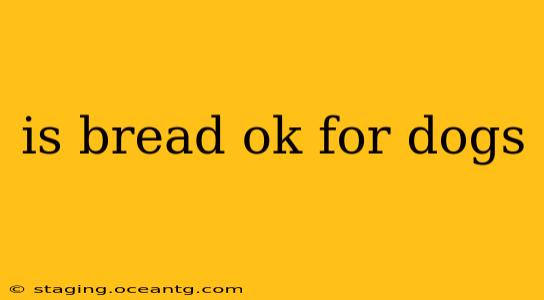Bread, a staple in many human diets, often sparks the question: "Is bread okay for dogs?" The simple answer is nuanced. While a small amount of plain bread won't likely harm a healthy adult dog, it's not exactly a nutritional powerhouse and can even be detrimental in certain situations. This guide will delve into the details, exploring the potential benefits and risks, addressing common concerns, and offering expert advice for responsible pet ownership.
What Kind of Bread is Safe for Dogs?
The type of bread significantly impacts its suitability for canine consumption. Plain, unsalted bread is the safest option. Avoid bread containing:
- Raisins: These are highly toxic to dogs.
- Onions and Garlic: These are also toxic and can damage red blood cells.
- Chocolate: Contains theobromine, which is harmful to dogs.
- Xylitol: An artificial sweetener that can cause a rapid drop in blood sugar and liver failure.
- Yeast: Large amounts of unbaked yeast dough can ferment in a dog's stomach, producing alcohol and causing potentially life-threatening complications.
- Nuts: Many nuts, like macadamia nuts, are toxic to dogs.
- Excessive salt or sugar: These can contribute to health problems in dogs.
Essentially, stick to plain, white or whole wheat bread in small quantities.
Can Dogs Eat Bread Every Day?
No, dogs shouldn't eat bread every day. Bread offers little nutritional value for dogs. Their diet should primarily consist of dog food formulated to meet their specific nutritional needs. Giving your dog bread regularly can lead to:
- Weight gain: Bread is high in carbohydrates and can contribute to obesity.
- Nutritional deficiencies: It lacks essential nutrients dogs require.
- Digestive upset: Some dogs may experience gas, diarrhea, or vomiting from eating bread.
What Happens if a Dog Eats Too Much Bread?
The consequences of consuming too much bread depend on the type of bread and the dog's individual sensitivity. While small amounts are usually harmless, excessive bread consumption can lead to:
- Pancreatitis: Inflammation of the pancreas, a serious condition.
- Obesity: Excess calories lead to weight gain and related health problems.
- Digestive issues: Vomiting, diarrhea, and gas are common symptoms.
- Blood sugar spikes: Especially concerning in dogs with diabetes.
Is Bread Good for a Diabetic Dog?
No, bread is generally not recommended for diabetic dogs. Its high carbohydrate content can significantly impact blood sugar levels, making it difficult to manage the condition. Consult your veterinarian for a suitable diet plan for your diabetic dog.
Can Puppies Eat Bread?
Similar to adult dogs, puppies should only consume small amounts of plain bread occasionally. Their digestive systems are still developing, and large quantities of bread can cause digestive upset. Prioritize puppy food that meets their nutritional requirements.
My Dog Ate Bread, Should I Be Worried?
If your dog ate a small amount of plain bread, you likely don't need to worry. However, monitor them for any signs of digestive upset, such as vomiting, diarrhea, or lethargy. If you notice any unusual symptoms or if your dog consumed a large quantity of bread, especially bread containing toxic ingredients, contact your veterinarian immediately.
Conclusion: Bread and Dogs – Moderation is Key
In conclusion, while a tiny piece of plain bread won't likely harm your dog, it shouldn't be a regular part of their diet. Prioritize a balanced dog food designed to meet their nutritional needs. Always check the ingredients and avoid bread containing toxic substances. If you have concerns about your dog's diet, consult with your veterinarian for personalized advice.
